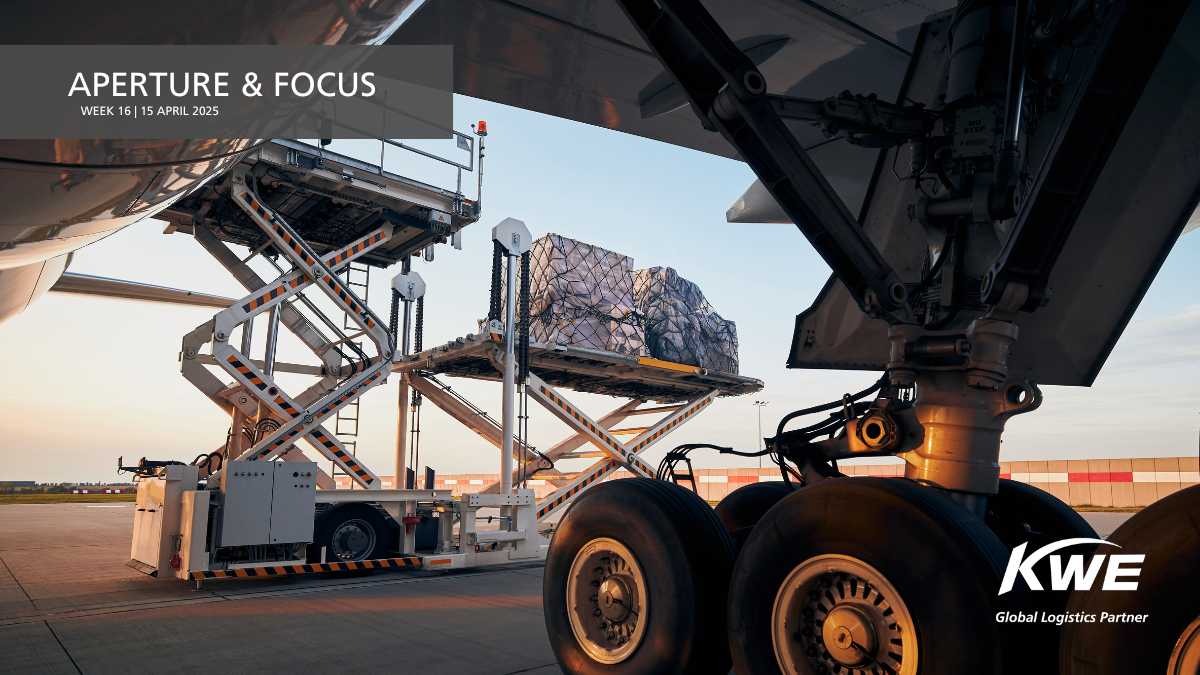Quote
Aperture & Focus 2025: Week 16

Global Aperture
The UN's International Maritime Organization (IMO) approved draft amendments to MARPOL Annex VI, requiring the shipping industry to significantly reduce greenhouse gas emissions, with the goal of achieving net-zero emissions by mid-century. Ships failing to meet emissions reduction targets will need to buy remedial units, and the regulations are expected to come into effect in 2027.
During the week of April 8th–14th, 2025, global air cargo volumes declined significantly due to the Eid-al-Fitr holiday, with steep drops from major markets across Asia and the Middle East. Demand from China and Hong Kong to the U.S. also weakened for the first time this year, signaling growing uncertainty in international trade.
Regional Focus
Americas
United States: The Port of Los Angeles reported a strong first quarter in 2025 with a 5.2% year-over-year increase in cargo volumes, but looming tariffs are expected to trigger a sharp downturn starting in May. Projections show significant declines through the summer, with July and August volumes potentially dropping over 25% compared to 2024.
U.S. President Donald Trump has temporarily exempted smartphones, laptops, and other tech products from steep tariffs on Chinese imports, sparing companies like Apple and Microsoft—though he warned these exemptions may be short-lived. While Chinese tech will still face a 20% tariff under a different category, financial markets remain volatile amid ongoing tariff shifts and a looming national security trade investigation into the semiconductor and electronics sectors.
A U.S. Customs "glitch" that lasted over 10 hours on April 11th, 2025, disrupted tariff exemptions for freight already en route from China and countries under a 90-day tariff pause. The issue affected the system for filing proper tariff codes, causing delays and confusion for U.S. importers and customs brokers amid ongoing policy changes and heightened trade uncertainty.
More information on the latest U.S. tariff updates can be found in KWE’s latest Customer Advisory.
Asia-Pacific
China: Airfreight demand from China and Hong Kong to the U.S. dipped 1% in the week ending April 6, amid a broader global decline in cargo volumes and escalating trade tensions. Analysts link the 7% drop in global demand to the Eid holidays and growing uncertainty over new U.S.-China tariffs. They warn that the full impact of the 145% U.S. tariffs on Chinese imports and China's 125% tariffs on U.S. goods may become clearer in the coming weeks.
Asian manufacturers are rushing to ship goods before July 7th, following a 90-day moratorium on additional U.S. tariffs announced on April 8th, which temporarily halted planned increases beyond the baseline 10% tariff imposed on April 5th—excluding imports from China. Taiwanese and Malaysian exporters, facing container shortages and shipping delays, are racing to move nearly a year’s worth of stock amid uncertainty about future trade terms.
Europe, Middle East & Africa
European ports like Rotterdam, Hamburg, and Barcelona are seeing unprecedented congestion as rerouted ships from the US-China trade war flood in, with vessel numbers surging up to tenfold compared to last year. Trump's 145% tariffs and proposed $1 million docking fees on Chinese-made ships have triggered widespread shipping chaos, stranding vessels and disrupting global trade flows.
Germany: Frankfurt Airport's cargo throughput rose by 3.2% year-on-year to 184,679 tonnes in March 2025, despite a decline in North American freighter volumes and a strike by the Verdi trade union. The airport saw significant growth in China-related traffic, which increased by 30.2%, while U.S. traffic declined by 1.1%, and overall Q1 cargo volume was slightly down by 0.3% compared to 2024.